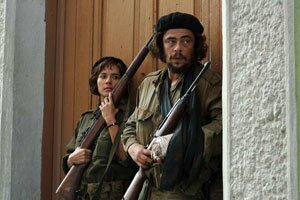MOVIE REVIEW- Rebel redux: This <i>Che</i> convoluted, confusing

PUBLICITY PHOTO
There's a history lesson in Che Part One, but it's the kind that puts kids off history lessons. Peter Buchman's screenplay bombards you with details without establishing any interesting people or an engaging story line. Fragmented and disjointed, it interrupts itself whenever it threatens to get any narrative momentum going.
Chronologically, Che Parts One and Two (Part Two is marginally better) could be Parts Two and Three of The Motorcycle Diaries, which dealt with the formative years of Ernesto "Che" Guevara and was superior in every way. Che picks up three years later, in 1955.
Ernesto (Benicio Del Toro) is living in Mexico with his wife and daughter– whose existence isn't mentioned for an hour and a half, until he faces romantic temptation with Aleida (Catalina Sandino Moreno). He's part of a group plotting to overthrow Batista's 1952 coup in Cuba. They must be pretty important because Fidel Castro (Demian Bichir) pays them a personal visit.
In November 1956, 82 men, including Guevara, leave Mexico for Cuba. When they meet up with the main rebel force there, everyone lines up to be greeted individually by Ernesto, as our introduction to them. This is almost as stupid as the film's opening, a map of Cuba on which are s-l-o-w-l-y revealed several regions and cities, most of which will never be mentioned again. A number of poorly written vignettes exist only to introduce a character or two or make a minor point. They don't build to much, and there are no maps to help us visualize the military strategy when we need them.
Unnecessary jumping around in time and place makes extra exposition necessary, adding to the information overload. The first shot is of Che being interviewed in Havana in 1964. That same year he makes a "goodwill" visit to New York (where he's also interviewed), where he's greeted by protestors and a (not entirely idle) bomb threat when he speaks to the United Nations. With other countries responding to his speech and Guevara rebutting them, the UN scenes are like a roast without the humor.
Most of the film takes place in Cuba in 1957 and '58, as the rebel forces grow and challenge Batista's army. Not only isn't there much character development, but scene after poorly lit scene of bearded men talking in shadow adds to viewer confusion about who's who.
Che hardly has more of a point of view than W. Because he's a leader in a rebellion against an oppressive dictatorship and has the people's interests at heart, Guevara is sort of a hero for most of the picture. (Significantly, there's no mention, for over an hour and a half, of Soviet Communists backing the revolution.) But the frequent cuts to 1964 allow us to engage our hindsight and realize the cure may have been worse than the disease.
Screenwriter Buchman did a lot of research and obviously hated to let any of it go to waste. He may be a great historian, but he's doesn't know a thing about telling a story. Director Steven Soderbergh, who does, shouldn't have signed off on this script without extensive editing, because what has reached the screen is a mess.
#